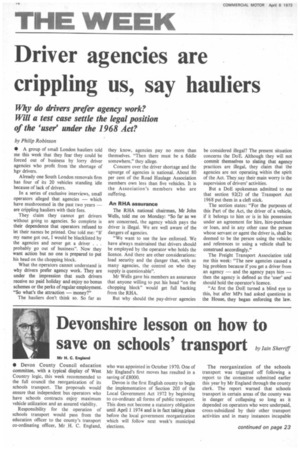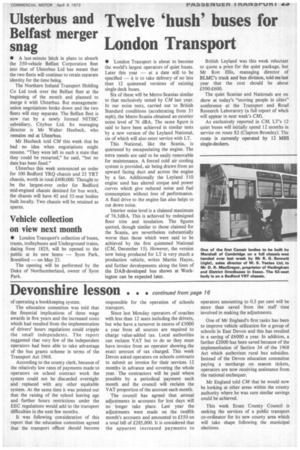Devonshire lesson on how to
Page 18

Page 25

If you've noticed an error in this article please click here to report it so we can fix it.
save on schools' transport by lain Sherriff
Mr H. C. England
• Devon County Council education committee, with a typical display of West Country logic, this week recommended to the full council the reorganization of its schools transport. The proposals would ensure that independent bus operators who have schools contracts enjoy maximum vehicle utilization and an assured viability.
Responsibility for the operation of schools transport would pass from the education officer to the county's transport co-ordinating officer, Mr H. C. England, who was appointed in October 1970. One of Mr England's first moves has resulted in a saving of £8000.
Devon is the first English county to begin the implementation of Section 203 of the Local Government Act 1972 by beginning to co-ordinate all forms of public transport. This does not become a statutory obligation until April 1 1974 and is in fact taking place before the local government reorganization which will follow next week's municipal elections. The reorganization of the schools transport was triggered off following a report to the committee submitted earlier this year by Mr England through the county clerk. The report warned that schools transport in certain areas of the county was in danger of collapsing so long as it depended on operators who were underpaid, cross-subsidized by their other transport activities and in many instances incapable of operating a bookkeeping system.
The education committee was told that the financial implications of three wage awards in five years and the increased costs which had resulted from the implementation of drivers' hours regulations could cripple the small independents. The report suggested that very few of the independent operators had been able to take advantage of the bus grants scheme in terms of the Transport Act 1968.
According to the county clerk, because of the relatively low rates of payments made to operators on school contract work the system could not be discarded overnight and replaced with any other equitable system. At the same time it was pointed out that the raising of the school leaving age and further hours restrictions under the EEC regulations would add to the transport difficulties in the next few months.
It was following consideration of this report that the education committee agreed that the transport officer should become responsible for the operation of schools transport.
Since last Monday operators of coaches with less than 12 seats including the drivers, but who have a turnover in excess of £5000 a year from all sources are required to charge value-added tax. Local authorities can reclaim VAT but to do so they must have invoice from an operator showing the exact amount of tax charged. This week Devon asked operators on schools contracts to submit an invoice for their services 12 months in advance and covering the whole year. The contractors will be paid where possible by a periodical payment each month and the council will reclaim the VAT proportion of the account each month.
The council has agreed that annual adjustments in accounts for lost days will no longer take place. Last year the adjustments were made on the twelfth month's accounts and amounted to £550 on a total bill of £285,000. It is considered that the apparent increased payments to
operators amounting to 0.3 per cent will be more than saved from the staff time involved in making the adjustments.
One of Mr England's first tasks has been to improve vehicle utilization for a group of schools in East Devon and this has resulted in a saving of £6000 a year. In addition, a further £2000 has been saved because of the implemeritation of Section 34 of the 1968 Act which authorizes rural bus subsidies. Instead of the Devon education committee paying a surcharge on season tickets, operators are now receiving assistance from the national exchequer.
Mr England told CM that he would now be looking at other areas within the county authority where he was sure similar savings could be achieved.
This week Essex County Council is seeking the services of a public transport co-ordinator for its new county area which will take shape following the municipal elections.












































































































